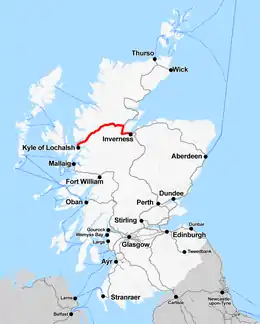Kyle of Lochalsh line
The Kyle of Lochalsh Line is a primarily single track railway line in the Scottish Highlands, from Dingwall to Kyle of Lochalsh. Many of the passengers are tourists, but there are also locals visiting Inverness for shopping, and commuters. All services are provided by Abellio ScotRail and run beyond Dingwall to Inverness. In the past there were some through services to/from Glasgow, Edinburgh or Aberdeen.[1] None of the line is electrified, and all trains on the line are diesel-powered, as are all other trains in the Scottish Highlands.
| Kyle of Lochalsh Line | |||
|---|---|---|---|
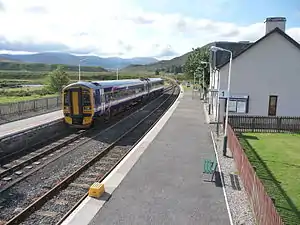 | |||
| Overview | |||
| Status | Operational | ||
| Owner | Network Rail | ||
| Locale | Highland Scotland | ||
| Termini | Dingwall Kyle of Lochalsh | ||
| Stations | 13 | ||
| Service | |||
| System | National Rail | ||
| Operator(s) | Abellio ScotRail | ||
| Rolling stock | Class 158 | ||
| Technical | |||
| Line length | Dingwall to Kyle of Lochalsh: 63 miles 64 chains (102.7 km) | ||
| Track gauge | Standard gauge 1,435 mm (4 ft 8 1⁄2 in) | ||
| |||
Kyle of Lochalsh Line | |||||||||||||||||||||||||||||||||||||||||||||||||||||||||||||||||||||||||||||||||||||||||||||||||||||||||||||||||||||||||||||||||||||||||||||||||||||||||||||||||||||||||||||||
|---|---|---|---|---|---|---|---|---|---|---|---|---|---|---|---|---|---|---|---|---|---|---|---|---|---|---|---|---|---|---|---|---|---|---|---|---|---|---|---|---|---|---|---|---|---|---|---|---|---|---|---|---|---|---|---|---|---|---|---|---|---|---|---|---|---|---|---|---|---|---|---|---|---|---|---|---|---|---|---|---|---|---|---|---|---|---|---|---|---|---|---|---|---|---|---|---|---|---|---|---|---|---|---|---|---|---|---|---|---|---|---|---|---|---|---|---|---|---|---|---|---|---|---|---|---|---|---|---|---|---|---|---|---|---|---|---|---|---|---|---|---|---|---|---|---|---|---|---|---|---|---|---|---|---|---|---|---|---|---|---|---|---|---|---|---|---|---|---|---|---|---|---|---|---|---|
| |||||||||||||||||||||||||||||||||||||||||||||||||||||||||||||||||||||||||||||||||||||||||||||||||||||||||||||||||||||||||||||||||||||||||||||||||||||||||||||||||||||||||||||||
History
The route was built in three sections:
- Inverness and Ross-shire Railway between Inverness and Dingwall, opening on 1 October 1864.
- Dingwall and Skye Railway between Dingwall and Stromeferry, opening on 19 August 1870.[2]
- Kyle of Lochalsh Extension (Highland Railway) between Stromeferry and Kyle of Lochalsh, opening on 2 November 1897.[3]
The Strathpeffer Branch operated between 1885 and 1951.[4]
In 1933, the London, Midland and Scottish Railway introduced two named trains on the line, The Hebridean and The Lewisman.[5]
In July 1939 a landslide between Attadale and Stomeferry derailed an engine and six freight vans. The landslide was caused by recent heavy rains.[6]
In 1949 it was planned to relocate Lochluichart station to allow the flooding of the area by the Glascarnoch-Luichart-Torr Achilty hydroelectric scheme.[7] On 3 May 1954 a new station was opened as Lochluichart.[8] The deviation required about 2-mile (3.2 km) on stone-pitched embankments and in rock cuttings, a 100-foot (30 m) bridge over the River Conon and a 36-foot (11 m) bridge.[9]
In the 1960s the line was listed to be closed under the Reshaping of British Railways report; however it was reprieved and services continued.[10]
In 1970, British Rail wanted to close the line when Ross and Cromarty council voted to create a new £460,000 (equivalent to £7,200,000 in 2019)[11] ferry terminal at Ullapool (43 miles from Stornoway) replacing that at Kyle of Lochalsh (71 miles from Stornoway).[12] In December 1971 it was reported that the costs of operating the line were £318,000 per annum (equivalent to £4,530,000 in 2019),[11] with revenue of £51,000 per annum (equivalent to £730,000 in 2019),[11] and the Secretary of State for Transport agreed that the line should close,[13] but a spirited local campaign again succeeded in reversing this decision and keeping it open.
In 1989 the bridge over the River Ness at Inverness was washed away, leaving both the Kyle line and the Far North Line stranded, but new "Sprinter" trains were brought over by road, and a temporary yard was built to service them at Muir of Ord. The section of line along Loch Carron is particularly troublesome and prone to landslides, often closing that section.
Cascaded Rolling Stock
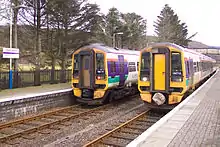
From 1999 onwards, the then ScotRail operator, National Express, began the removal of the Class 156 "Sprinter" trains. Their replacement was to be the faster, higher standard Class 158s. These trains offered a better all round travelling experience, with air conditioning, improved speed, lighting, seating, storage and general comfort. There is now a dedicated fleet of Class 158 units based at Inverness serving the Kyle of Lochalsh line, the Far North Line to Wick and Thurso, and the Aberdeen to Inverness Line. The next franchise owner First ScotRail had continued the current situation, with improvement to the depot facilities at Inverness.
Services
| Timetable (2019/20) | Mon - Fri | Saturday | Sunday |
|---|---|---|---|
| Four | Four | One |
Onward transport interchanges
| Interchange | Stop ID SMS Code | Connections | Service Numbers |
|---|---|---|---|
| Dingwall | 45323484 | Connections to Strathpeffer and the north of the Black Isle | S10, 21 |
| Garve | 45324737 (East) 45324754 (West) | Scottish Citylink coach services to Ullapool (for ferry services to Stornoway on Lewis) | 61[14] |
| Achnasheen | 45327657 | Highland Council bus links westward to Gairloch | 700, 708 |
| Strathcarron | 45328548 | Highland Council bus connections onwards to the villages of Lochcarron, Kishorn, Shieldaig, Torridon and Applecross | 702, 703, 704 |
| Kyle of Lochalsh | 45323763 | Scottish Citylink coaches westward to Portree and Uig on Skye (for ferry services to Tarbert on Harris and Lochmaddy on North Uist), eastwards to Kintail and Fort William | 915, 916, 917[14] |
Route
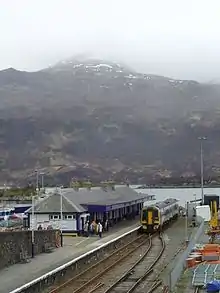
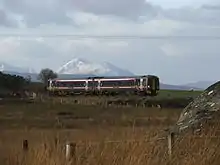
The stations on the line that have passing loops are Muir of Ord, Dingwall, Garve, Achnasheen and Strathcarron. Only Dingwall and Kyle stations are staffed, however all stations along the route have lighting and passenger information posters with train timetable details. Most have passenger information telephone points fitted so that remote customer service staff can be contacted. Normal office hours apply. Along the route there are 29 bridges and 31 cuttings.
| Places served | No. of Platforms | Staffed | Ordnance Survey grid references |
|---|---|---|---|
| Dingwall | Two | Yes | NH553586 |
| Garve | Two | No | NH395613 |
| Lochluichart | One | No | NH322625 |
| Achanalt | One | No | NH260615 |
| Achnasheen | Two | No | NH164586 |
| Achnashellach | One | No | NH003485 |
| Strathcarron | Two | No | NG942421 |
| Attadale | One | No | NG924391 |
| Stromeferry | One | No | NG865346 |
| Duncraig | One | No | NG811331 |
| Plockton | One | No | NG794329 |
| Duirinish | One | No | NG777315 |
| Kyle of Lochalsh | Two | Yes | NG762271 |
Kyle of Lochalsh Line in film and books
The Kyle of Lochalsh Line was featured in Eddie McConnell's lyrical documentary The Line to Skye (1973) with commentary by Scottish writer William McIlvanney, commissioned as part of Ross & Cromarty's campaign to keep the line open at a time when it was threatened with closure. The film follows the train from Inverness to Kyle of Lochalsh, describing the communities, landscape and wildlife along its route, while contrasting the frustration of motorists with the relaxation of the journey by rail.[15]
In Stephen Durrell's 1939 documentary West of Inverness, the importance of the Kyle of Lochalsh line to the crofters of the West Highlands is demonstrated through its role of transporting passengers, mail, parcels, food and livestock to and from their communities. The film shows the LMS steam locomotives that operated the line at this time.[16]
In the episode of Great Railway Journeys of the World "Confessions of a Trainspotter" (1980), Michael Palin travels from London to the Kyle of Lochalsh and returns with the railway station's sign.
Video 125 Ltd. produced a driver's eye view documentary of the line in 1987, when the service was still operated using loco-hauled trains, in this case motive power being provided by Class 37 no. 37262 named Dounreay after the nuclear power station. Narration was by Paul Coia.
Nicholas Whittaker travelled the line both ways during the summer of 1973, an experience he wrote about in his 1995 book Platform Souls.[17]
As with the other railway lines of the western Highlands (the West Highland Railway and the Callander and Oban Railway), John Thomas wrote a comprehensive and highly readable history, The Skye Railway.
References
- GB National Rail Timetable 2013-14, Tables 239 & 240 (Network Rail)
- "New Railway in the North". Morning Post. British Newspaper Archive. 20 August 1870. Retrieved 15 August 2016 – via British Newspaper Archive.
- "Railways in the Western Highlands. Opening of New Kyle Extension". Glasgow Herald. British Newspaper Archive. 3 November 1897. Retrieved 15 August 2016 – via British Newspaper Archive.
- H A Vallance, C R Clinker, Anthony J Lambert, The Highland Railway, David and Charles, Newton Abbot, 1985, ISBN 0 946537 24 0
- Allen, Cecil J. (1967). Titled Trains of Great Britain. Ian Allan Ltd. p. 95.
- "Scots relive nightmare of holiday train disaster". Aberdeen Evening Express. Scotland. 27 December 1962. Retrieved 15 November 2017 – via British Newspaper Archive.
- "A Station To Be Moved". Dundee Courier. Scotland. 6 May 1949. Retrieved 15 November 2017 – via British Newspaper Archive.
- Butt, R. V. J. (1995). The Directory of Railway Stations: details every public and private passenger station, halt, platform and stopping place, past and present (1st ed.). Sparkford: Patrick Stephens Ltd. ISBN 978-1-85260-508-7. OCLC 60251199.
- Cooke, B.W.C., ed. (June 1954). "Re-Siting of Lochluichart Station". The Railway Magazine. Vol. 100 no. 638. Westminster: Tothill Press. p. 432.
- "Rail Cuts Reprieve". Aberdeen Press and Journal. Scotland. 18 December 1963. Retrieved 22 November 2017 – via British Newspaper Archive.
- UK Retail Price Index inflation figures are based on data from Clark, Gregory (2017). "The Annual RPI and Average Earnings for Britain, 1209 to Present (New Series)". MeasuringWorth. Retrieved 2 February 2020.
- "Ross and Cromarty council vote. Ullapool is Ferry Terminal". Aberdeen Press and Journal. Scotland. 22 October 1970. Retrieved 25 November 2017 – via British Newspaper Archive.
- "British Railways Board. Public Notice. Transport Acts 1962-68. Passenger Services". Aberdeen Press and Journal. Scotland. 23 December 1971. Retrieved 25 November 2017 – via British Newspaper Archive.
- "Scottish Citylink Timetables". Retrieved 25 January 2013.
- "Scottish Screen Archive - Full record for 'LINE TO SKYE, the'". Retrieved 7 February 2009.
- "Scottish Screen Archive - Full record for 'WEST OF INVERNESS'". Retrieved 7 February 2009.
- Platform Souls. Nicholas Whittaker, Gollancz, 1995
Further reading
- Thomas, John (1977). The Skye Railway. David and Charles. ISBN 0 7153 7383 8.
- Kelly, Peter (September 1983). "Pearls beyond price". Rail Enthusiast. EMAP National Publications. pp. 23–33. ISSN 0262-561X. OCLC 49957965.
- Dunn, Pip (22 October – 4 November 1997). "The Skye survivor". RAIL. No. 316. EMAP Apex Publications. pp. 40–41. ISSN 0953-4563. OCLC 49953699.
- Vallance, H.A. (November 1966). "The Northern Highland Lines Today: Part One – Inverness to Kyle of Lochalsh". Railway Magazine. Vol. 112 no. 787. pp. 612–616.
External links
| Wikimedia Commons has media related to Kyle of Lochalsh Line. |
